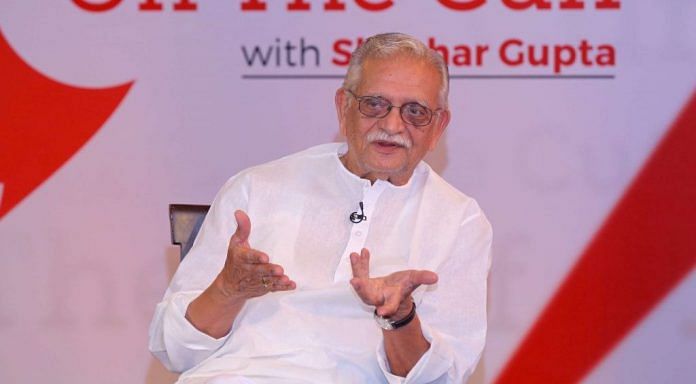New Delhi: There was nothing extraordinary about the 1975 film Aandhi being banned during the Emergency, poet-author-filmmaker Gulzar has said. “All political parties behave like this. This is the case now and it was the case back then,” he said in conversation with ThePrint’s Editor-in-Chief Shekhar Gupta on Off the Cuff.
Gulzar also spoke about the Bengali influence in his life and work, his experience of working with stalwarts of the entertainment industry in the past 60 years, and how his interaction with them shaped his writing.
Some of these stalwarts include Bimal Roy, Salil Chowdhury, Hemant Kumar, Satyajit Ray, Uttam Kumar, Hrishikesh Mukherjee, Pandit Ravi Shankar, Suchitra Sen, Sharmila Tagore, Ritwik Ghatak, Samaresh Basu, Basu Bhattacharya, Pandit Bhimsen Joshi, Mahasweta Devi, and Tarun Majumdar.
In his latest book, Actually… I Met Them, A Memoir, Gulzar illustrates his decades-long career through his work with Kishore Kumar, R.D. Burman, Sanjeev Kumar and other legends. “I wrote about my encounters with all these stars as they happened to me,” Gulzar said.
Talking about Aandhi, where a scene shows Suchitra Sen’s character sitting in front of a table on which there was a glass of liquor and a lit cigarette in an ashtray, he said, “Until then, only vamps were shown to be drinking and smoking. I didn’t think this was right. I deliberately didn’t show her gulping the drink, I knew the censor board could cause some issue, that’s all.”
“I was told this scene was discussed within the Gandhi family, where Sanjay Gandhi reacted to it very sharply,” Gulzar said, adding that he thought he could get away with it.
On his style of infusing allegory in his work, Gulzar underlined how personification and imagery are widespread in the Punjabi sense of humour. On feeling restricted about his freedom of expression, he said, “I believe I have adapted well to the changing times. But it will be better if the audience judges this, they will know better.”
“If you are aware of your surroundings and you are receiving whatever is happening around you, you don’t need any other motivation. You must react to everything in life,” he said.
Also read: ‘There is need to idiot-proof everything’ — Gulzar says climate of fear looms over art today
The madness that lives with a genius
Reminiscing about the past, Gulzar said, “Kishore da, Pancham (R.D. Burman) and Sanjeev Kumar were obsessed with their work. They were all mad, and it would not be fair to say who was madder. It’s the kind of madness that lives with a genius.”
Talking about the song Musafir Hoon Yaaron from the 1972 film Parichay — written and directed by him – Gulzar detailed how the tune for the iconic song came about. “It must have been around midnight. I was at home and Pancham called me, asking me to come down. He said he wanted me to listen to a song in his car,” he said.
“We kept rewinding the cassette, he had worked out the entire beat for the antara and asked me for dummy lyrics to sing it to. We drove from Bandra to Juhu and then back and by then, the song had begun to take shape,” he said, adding that it’s not often such mad people come into your life. “Vishal Bhardwaj is another such mad person,” he said.
Recalling an incident about a dialogue from the 1975 Sharmila Tagore-starrer Mausam, wherein she played a double role — one of which was of a young sex worker — Gulzar said, “She felt embarrassed to deliver that dialogue, she couldn’t say that to me. But Sanjeev Kumar, who was her co-star, convinced her to deliver the dialogue, and with a trick.”
The dialogue was: “I’ll go with you and I will sleep with you. But if you ask me to sleep with your friends, I won’t do that.”
(Edited by Neha Mahajan)
Also read: In search of home in a pandemic — Gulzar’s new poem likens migrant crisis to Partition




